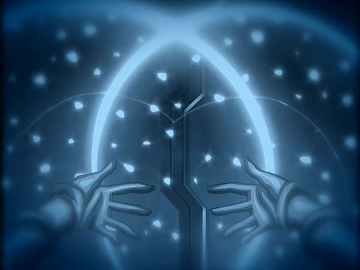In the episode, The Aftermath the Metalbending Police Force has been investigating Future Industries factories for collusion and production of weapons by Hiroshi Sato with the Equalists.
It is later discovered that Hiroshi Sato was producing weapons in a secret factory beneath his home and Korra, Tenzin and Lin investigate that factory in a search with the Metalbending Police Forces. This search reveals the latest secret weapon of the Equalists, the Mecha Tanks. The mecha tanks, which are controlled by Equalists from the inside, attacked Korra and the other intruders. The mechs were easily able to knock Korra, Tenzin, Lin, and the other police officers unconscious during the battle. Korra, Tenzin, and Lin, however, were rescued by Bolin and Mako while the Equalists were busy loading the police officers into their trucks. Sato reveals the tanks are made of pure platinum and unable to be affected by metalbending arts.
The Equalist devices appear very similar to the steampunk-style Big Daddy and Handyman from the Bioshock video game series. In real life, platinum is a very malleable metal, almost as soft as gold, and would be useless as armor (although the lack of firearms might render this less of an issue). In addition, platinum is very expensive, furthering it's usage in armor being problematic at best.
So how do we explain:
- Why can't metal benders bend platinum? It is a metal, after all. It should be well within their ability to affect.
- Is it the purity of the metal that makes it resistant, or the rarity or lack of exposure to platinum that makes it impossible to bend?
- Is there something about metalbending that requires impurities in metals to make them able to be bent? If so, what impurities and in what quantities make a metal able to be affected by Earthbending?
I understand any answers that are generated will be speculation, so what I am seeking is intelligent speculation that treats this as a serious question that expands the discourse on the Avatar world.
The Aftermath: The Legend of Korra. Nickelodeon. May 19, 2012. No. 7, Book 1: Air

